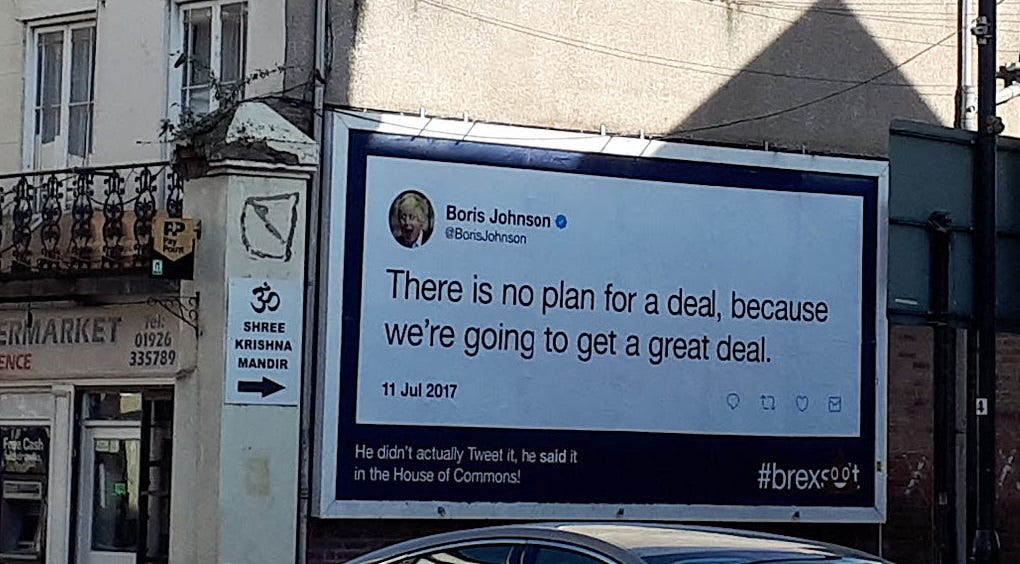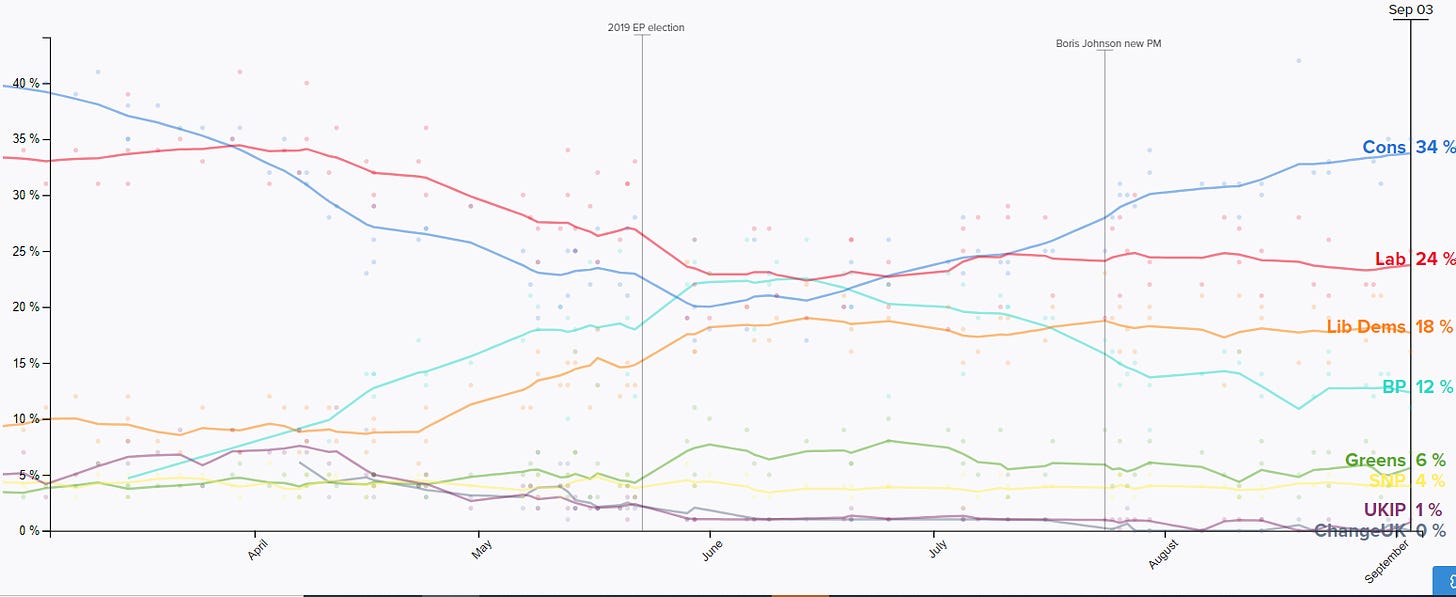Friday, September 6, 2019
Political Disruption brings you insights on how the fast-changing global political environment is creating a political disruption of business.
Good Morning!
This week I crunch my teeth on Brexit, the gift that keeps on giving (if you like to talk about political disruption at least :-) )
Welcome to a new week of Political Disruption!
Hans Diels
Is this the end of no-deal? No, it isn’t!

Anti-Brexit poster, Leamington Spa High Street, Stephen Craven
Where are we now?
In a 328-301 vote supported by former government ministers and other Tory rebels, the UK parliament has taken control over its agenda, which is normally controlled by the government. Parliament needed to do this if it wanted to block PM Boris Johnson’s plan to leave the EU with or without a deal. He even lost his parliamentary majority as former justice minister, Phillip Lee, quit the party to join the Liberal Democrats. Parliament voted on wednesday on a bill that forces Johnson to ask for an extension of the October 31 deadline if the EU and the UK do not reach a new deal.
How will things move on from here?
Johnson has repeatedly said that he will not ask the EU for an extension, so he probably might use every trick up his sleeve to stop the bill from moving forward. After passing in the House of Commons, it has to go to the House of Lords (probably today) and then the PM has to send it to the Queen for royal assent.
What Johnson can do is call early elections, trying to dissolve parliament before the bill becomes law. Johnson would like to hold an election on October 14 or 15 a few days before the European Summit on October 17. With a new mandate after campaigning for a ‘come what may’ Brexit, he could find himself in a stronger position.
But Johnson would need two-thirds of parliament to trigger an early election under the 2011 Fixed Term Parliaments act. Therefore he would require the support of Labour. While Labour has said it would like elections, Labour wants to be sure that the anti-no-deal Brexit law is on the statute books (meaning it has passed the House of Commons, the Lords and has the assent of the Queen).
No No-Deal, but what do we want?
The main problem has been that while a majority of MP’s has always been against a no-deal Brexit, they have never been able to formulate an alternative. None of the Brexit options has been able to get a majority in the parliament. And this seems not to have changed. These are the different groups:
There are the hard-but-not-crazy Brexiteers, who do want a clear break with the EU but do not want to jump off the no-deal cliff, this group wants a Canada-style trade deal with the EU, nothing more, nothing less.
There are the soft-Brexiteers, who want an exit from the EU, but want some or another form of connection with the EU (single market or customs union).
There are the moderate-remainers, who wanted to stay in the EU but now the referendum has gone the other way, want to remain as much integrated with the EU as possible from the outside (single market and customs union).
Finally, there are the diehard-remainers who want no Brexit deal, who want a new referendum and stay in the EU.
Elections?
Now Johnson has lost his majority it seems nothing more than a question of timing before elections will be called. This can be done in two ways:
Either by Johnson himself. For this he needs a 2/3 majority in parliament. Labours seems not ready to give this to the PM as they want to be sure that the Brexit extension bill is approved by both houses of parliament and sent to the Queen.
Or by a vote of no-confidence in the government. Here only a simple majority is needed and MPs have four days to form an alternative government. When no new government can be formed elections are called at least seven weeks after no confidence vote.
Election prospects
While Boris Johnson’s Conservative Party has been leading in the polls since he became PM, he’s polling at 34% of the votes. Given the UK’s first-past-the-post system (which rewards the first party) this could be enough to have a majority in parliament, it remains a big gamble.
Johnson has two advantages at this moment:
He seems to have united the leave-vote. Since he became PM polls show that the conservatives have gained votes to the detriment of Nigel Farage’s Brexit Party (see figure).
The remain vote is heavily divided. Labour is polling relatively weakly while the Lib Dems have their best polling in 10 years. And the Greens and the SNP are further dividing the remain vote.
In the UK’s first-past-the-post system only the biggest party in a district gets a seat, this is an advantage for the biggest party.

Source: Politico: https://www.politico.eu/europe-poll-of-polls/united-kingdom/
What happens after the elections?
What happens if the UK holds elections (before or after the October 31 deadline)?
Scenario 1: Conservatives win the election
If Johnson’s party wins the election, it will be a much more united pro-Brexit party. The ‘rebels’ who joined the opposition to extend the Brexit deadline, will not be able to stand in elections for the Tories and will (probably) be replaced by hardline Brexit loyalists.
The haggling with the EU will continue, and prospects for a solution remain dim, as the conservatives are so divided on Brexit, that no deal will satisfy the hardline Brexiteers. If Boris Johnson wins a majority in the elections, the probability of a no-deal Brexit will be higher than they’ve ever been. If elections are held before the deadline, the new parliament could scupper the current bill and the UK would probably crash out on October 31.
(Scenario 1b: Conservatives win and persuade EU to change)
A low probability alternative version of this scenario is that a big win by the conservatives would lead the EU to change its position on the backstop and negotiate an considerably better deal. This has a very low probability as this would weaken the EU’s negotiating position with other bullies (read Trump, China…). In addition it would make leaving the EU much more atractive to other disgruntled members with populist governments.
Scenario 2: Labour takes over control
While a labour victory seems very unlikely given their current polling, it would mean the UK government will negotiate a new deal with the EU. Labour prefers the UK to stay in the customs union and have a close single market relationship. So a Norway + scenario could be possible (Norway is in the Single Market, not in the Customs Union). This would eliminate the backstop as there would be no need for a hard border in Ireland.
Scenario 3: Liberal Democrats join or support a government
The LibDems are polling good and are expected to make serious gains in the next elections. Given the relatively low polling results for both the Conservatives an Labour, the LibDems could turn out the party choosing the next government. The LibDems want in principle to stay in the EU and want to subject any Brexit deal to a new referendum. Whether they will get this approved in a deal with either the Conservatives and Labour (which still has a Brexit-faction) is doubtful. But any government that has to use support from the LibDems will have to negotiate a deal that would leave the UK much closer to the EU (customs union, single market).
Scenario 4: A new referendum on Brexit.
A fourth scenario remains a new referendum on Brexit. The question then becomes: Which question will the government ask the population. Will it be a binary choice between the current deal and staying in the EU? This will not please the Brexiteers in the conservative party who think the deal is not good enough. But what is the alternative? A range of options (WTO-conditions, customs union, single market, staying in)? And a second referendum will open a new range of questions. If the result would be very outspoken, it could work. But, as it seems at the moment, there will be a very tight result (with the remain side winning this time), what will keep Brexiteers from arguing for a third referendum?
So if you thought we were getting close to the end-game…. We are getting closer, but the end-game will be a long one.


